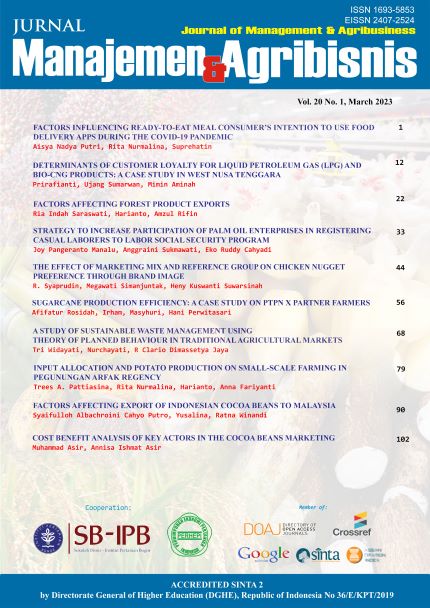The Input Allocation and Potato Production on Small-Scale Farming in Pegunungan Arfak Regency
Abstract
Small-scale potato farming in the Arfak Mountains needs attention in allocating inputs for efficient farming. This study aims to describe the allocation of the use of potato farming inputs, analyze the factors that affect potato production, and analyze the level of technical efficiency of potato farming in the Arfak Mountains. Arfak Mountains Regency was chosen purposively as the research location. Data collection starts from December 2021 to February 2022. Sampling was done by snowball sampling with a sample of 140 respondents. The data used in this study is cross-section data which was analyzed using the Stochastic Frontier Cobb Douglas production function approach. The results showed that the average farmer in the Arfak Mountains controlled 0.07 hectares of land for potato farming, with a seed requirement of 22 kg per hectare. The factors that affect potato production are land, seeds, and female labor. The level of technical efficiency of potato farming is 73 percent. Improvements in farming management and extension assistance for good agricultural practices and the use of technology according to farmers' local wisdom need to be carried out to increase potato production and productivity.
Keywords: local knowledge, low input, potato, small-scale farming, technical efficiency
Authors
Authors who publish with this journal agree to the following terms:
- Authors retain copyright and grant the journal right of first publication with the work simultaneously licensed under a Creative Commons Attribution License that allows others to share the work with an acknowledgement of the work's authorship and initial publication in this journal.
- Authors are able to enter into separate, additional contractual arrangements for the non-exclusive distribution of the journal's published version of the work (e.g., post it to an institutional repository or publish it in a book), with an acknowledgement of its initial publication in this journal.
- Authors are permitted and encouraged to post their work online (e.g., in institutional repositories or on their website) prior to and during the submission process, as it can lead to productive exchanges, as well as earlier and greater citation of published work (See The Effect of Open Access).

